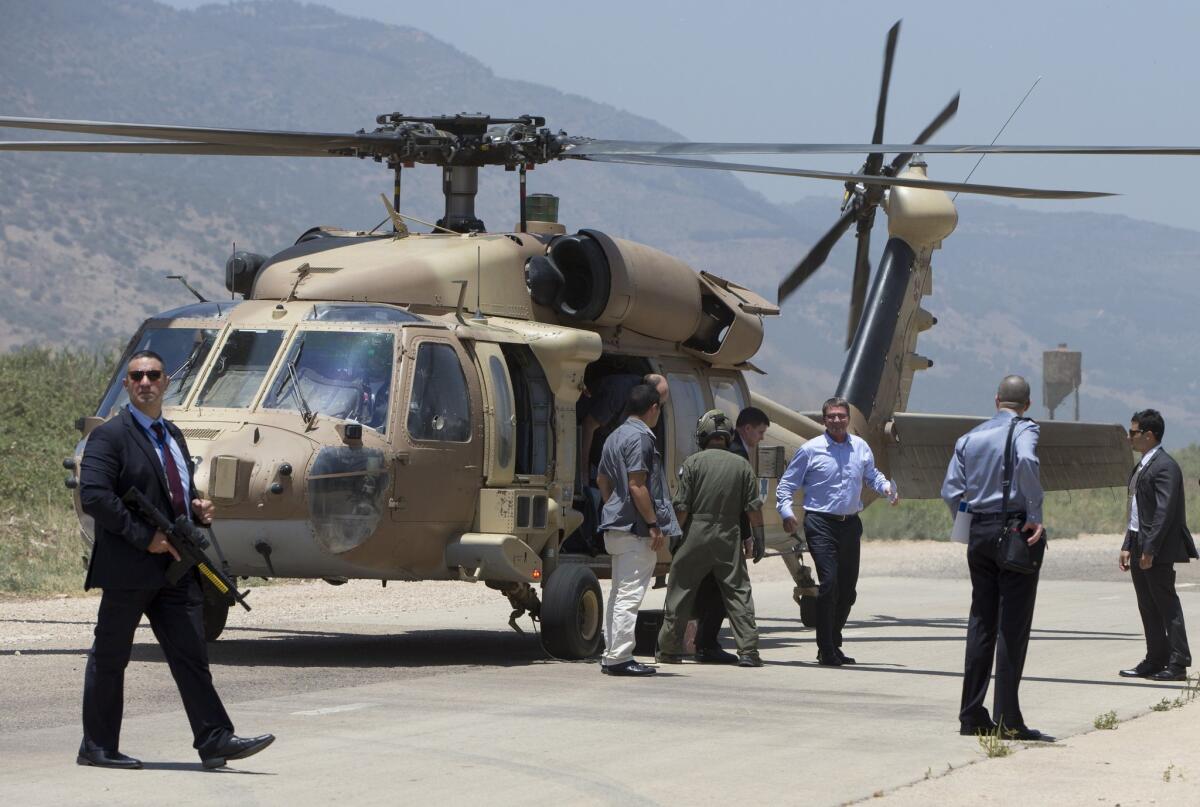Ashton Carter seeks to reassure Israelis on Iran nuclear deal

U.S. Defense Secretary Ashton Carter and Israeli Defense Minister Moshe Yaalon arrive July 20 near Yesod Hamala near Israel’s border with Lebanon.
- Share via
Reporting from Jerusalem — On the heels of the nuclear deal between Iran and six world powers, which has been roundly opposed by Israeli officials, U.S. Defense Secretary Ashton Carter began a Middle East tour Monday with an effort to assure the key American ally.
“The region is complicated and troubled but we know what our interests are,” Carter said during a meeting with his Israel counterpart, Moshe Yaalon, at the Israeli Defense Ministry in Tel Aviv. Principal among those interests, he said, is “the friendship and alliance with Israel.”
“Israel is the bedrock of American strategy in the Middle East,” said Carter, whose visit was scheduled before last week’s nuclear accord.
Israeli officials from Prime Minister Benjamin Netanyahu on down have been highly critical of the nuclear deal, which calls for placing restrictions on Tehran’s nuclear research and development in exchange for easing international sanctions.
The Israelis fear that easing the economic pressure will allow Iran to step up its support to militant groups such as Hezbollah while continuing to secretly develop nuclear weapons.
Early Monday, the United Nations Security Council unanimously approved a resolution backing the nuclear accord and beginning the steps toward rolling back the sanctions. The Israeli representative to the world body, Ron Prosor, denounced the vote as awarding “a great prize to the most dangerous country in the world.”
Following their meeting, Carter and Yaalon traveled by helicopter to northern Israel, where the secretary was briefed on the situation along Israel’s borders with Lebanon and Syria.
Carter welcomed the opportunity to see firsthand what he said were the two principal challenges to U.S. strategy in the Middle East: Iran’s “malign influence on the region, including through proxies like Hezbollah” as well as violent extremist groups such as Islamic State.
Carter said he and Yaalon discussed information- and intelligence-sharing, contingency planning and various scenarios regarding Syria, which is in its fifth year of a civil war, as well as Islamic State.
No package of additional U.S. assistance in the wake of the Iran agreement was believed to be on the table, but Israeli officials were quick to say this would not be discussed before the U.S. Congress votes on the deal.
“I assume that if Congress fails to change or improve the agreement, then we will discuss solutions,” Tzahi Hanegbi, head of the Israeli parliament’s Foreign Affairs and Defense Committee, told reporters Monday.
According to opposition lawmaker Tzipi Livni, these solutions must include “an entirely new order of securities, guarantees, arms and diplomatic agreements” that will help Israel and other Arab countries cope with the outcome of the agreement.
Netanyahu continued Monday to voice strong criticism of the deal, saying the U.N. vote was not the end of the road.
Speaking before the parliament, or Knesset, Netanyahu blasted the Security Council for accepting the deal on the same day that he said comments about destroying Israel came from Iranian leaders. “This hypocrisy knows no bounds,” he said.
Israel would continue to criticize the agreement, he said, adding that it “brings war closer” because the money Iran gains from the easing of sanctions will be directed toward financing terror and aggression. The accord will also lead to a nuclear arms race in the Middle East, he warned.
Netanyahu added that the U.N. decision was not “the end of the story” as long as U.S. sanctions on Iran remained in place. Noting that the economy of the United States is 40 times larger than that of Iran, Netanyahu said keeping American sanctions in place would force Iran to make concessions “and not just receive them.”
Carter is expected to meet with Netanyahu on Tuesday before continuing on to Saudi Arabia and Jordan.
Sobelman is a special correspondent.
More to Read
Sign up for Essential California
The most important California stories and recommendations in your inbox every morning.
You may occasionally receive promotional content from the Los Angeles Times.









